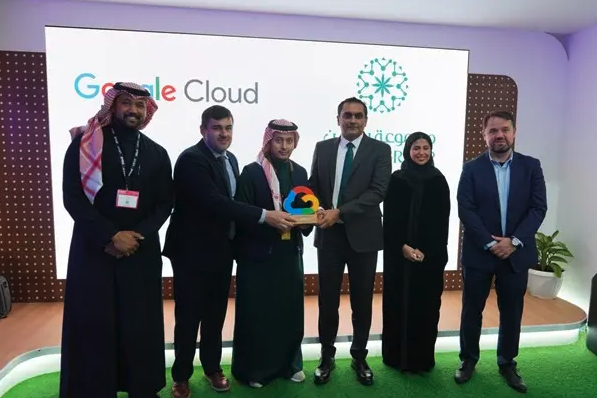For global AI competitiveness, US and Saudi Arabia have similar strategies

https://arab.news/4epu5
In the rapidly evolving landscape of artificial intelligence, two significant documents have recently emerged, offering a glimpse into how nations position themselves for the AI-driven future.
America’s “Vision for Competitiveness” and Saudi Arabia’s “National Strategy for Data & AI” present contrasting yet complementary approaches to harnessing the power of AI for national advancement.
These documents, while reflecting the unique contexts of their respective countries, provide valuable insights into the global race for AI supremacy.
The US strategy, rooted in its existing technological leadership, outlines a vision for maintaining and extending its competitive edge. In contrast, Saudi Arabia’s strategy, aligned with its Vision 2030 initiative, presents a blueprint for leveraging AI to transform its economy and society.
By analyzing these two strategy documents, we can extract vital insights about the future of global competitiveness in the AI era. Despite their different starting points, both nations share a profound understanding of AI as a force that will fundamentally reshape economies, societies, and the global balance of power.
This shared vision underscores the global impact of AI.
The US, leveraging its technological supremacy, sees AI as the next frontier to maintain its global leadership. In contrast, Saudi Arabia views AI as a catalyst for diversifying its economy and reducing oil dependence.
Despite these divergent motivations, both nations share striking similarities that illuminate the universal imperatives of the AI age. Both nations understand that human capital is the foundation of AI supremacy.
The US is committed to nurturing an AI-proficient workforce, with a focus on education and attracting global talent. Saudi Arabia has set ambitious goals, which include training 40 percent of its workforce in AI basics, to produce thousands of specialists and experts by 2030.
Despite their different starting points, both nations share a profound understanding of AI as a force that will fundamentally reshape economies, societies, and the global balance of power.
Mohammed A. Alqarni
This shared emphasis on talent underscores a crucial truth: In the AI era, the most valuable resource is not oil or silicon, but human intellect, and both nations are investing heavily in developing this resource.
The approach to innovation-ecosystem development is another area of convergence. Both strategies stress the importance of government, industry, and academia collaboration. However, their methods diverge interestingly.
The US leverages its existing tech hubs and entrepreneurial culture, while Saudi Arabia plans to build new innovation centers from the ground up, exemplified by the futuristic city of NEOM. This contrast highlights that there is no one-size-fits-all approach to fostering innovation; nations must play to their unique strengths.
Both countries aspire to global leadership but with different emphases. The US frames its AI strategy in the context of strategic competition, particularly with China. Saudi Arabia, meanwhile, sees an opportunity to establish itself as a new player in the tech world,
leveraging its position in the Arab and Islamic world to influence AI development in alignment with its cultural values.
This difference reminds us that AI leadership is not just about technological prowess but also about shaping this transformative technology’s ethical and cultural dimensions.
The regulatory approaches of both nations offer another interesting contrast. With its established tech industry, the US focuses on maintaining ethical standards and mitigating risks.
Eager to attract investment and talent, Saudi Arabia emphasizes creating an AI-friendly regulatory environment. This divergence points to a key challenge in the global AI landscape: balancing innovation with responsibility.
Perhaps the most striking difference lies in the specificity of their visions. Saudi Arabia’s strategy includes concrete targets and sector-specific plans, while the US provides a more general, long-term perspective. This difference reflects their different stages of AI development, governance structures, and planning approaches.
What can other nations learn from these two approaches? First, AI strategy must be tailored to national contexts and strengths. Second, developing human capital is universally crucial. Third, balancing innovation with ethical considerations is a global challenge that requires thoughtful navigation.
The global competitive landscape will be reshaped as we move deeper into the AI era. Traditional powerhouses like the US will strive to maintain their lead, while ambitious newcomers like Saudi Arabia will seek to leapfrog stages of development.
The success of these strategies will not just determine national competitiveness but will shape the nature of the AI-driven world we are creating.
In this new world, power may not be concentrated in a single pole or two but distributed among those who can best adapt to and shape the AI revolution. As other nations craft their own AI strategies, they would do well to study these contrasting approaches, learning from both the established leader and the ambitious challenger.
The race for AI supremacy is not just about economic dominance or technological prowess but about shaping the future of human society. There may not be a single winner in this race, but those who lead will have an outsized influence on our collective future.
As we watch this global competition unfold, one thing is clear: the AI revolution is here, and it will redefine global competitiveness for generations to come.
• Mohammed A. Alqarni is an academic and AI business consultant




























